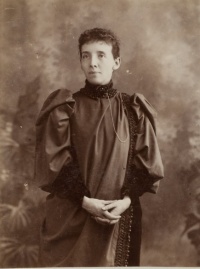Isabelle Cooper-Oakley: Difference between revisions
No edit summary |
No edit summary |
||
| Line 8: | Line 8: | ||
<blockquote> | <blockquote> | ||
I must mention the passing away of one worker whom you will all remember by name, and many by personal knowledge, my dear friend Mrs. Cooper-Oakley. She was suffering under consumption while she was here, two years ago. She would go back in the last bitter winter to Hungary, and that has killed the body, and left Hungary without its best worker.<ref>Annie Besant, "Presidential Address," ''The General Report of the T. S. 1914'' (Adyar, Madras, India: Theosophical Publishing House, 1915), 10.</ref> | I must mention the passing away of one worker whom you will all remember by name, and many by personal knowledge, my dear friend Mrs. Cooper-Oakley. She was suffering under consumption while she was here, two years ago. She would go back in the last bitter winter to Hungary, and that has killed the body, and left Hungary without its best worker.<ref>Annie Besant, "Presidential Address," ''The General Report of the T. S. 1914'' (Adyar, Madras, India: Theosophical Publishing House, 1915), 10.</ref> | ||
</blockquote> | |||
Professor O. Penzig, General Secretary of the Italian Section, wrote: | |||
<blockquote> | |||
Our Society has to record the sad loss it sustained during the year by the death of Mrs. Isabel Cooper-Oakley, to whom so much was owed by the Italian Section for its constitution and organisation at its inception, and during the first active years of its existence. Her memory will always live in the hearts of all members in this country with lasting gratitude.<ref>O. Penzig, "Report of the T. S. in Italy," ''The General Report of the T. S. 1915'' (Adyar, Madras, India: Theosophical Publishing House, 1916), 47.</ref> | |||
</blockquote> | </blockquote> | ||
Revision as of 20:27, 18 May 2017
Isabelle Cooper-Oakley was an English Theosophist who went to India with her husband A. J. Cooper-Oakley and H. P. Blavatsky in 1884. She returned to England the next year while her husband stayed on in India.[1] She was a member of HPB's Inner Group in London. Around 1893 she visited Sydney, Australia.
Henry Steel Olcott wrote to Francesca Arundale that "Mrs. Oakley has made the greatest hit among them all, and is vastly popular already" following her lectures at the 1884 annual convention at the Adyar headquarters of the Theosophical Society. He further reported that the Oakleys had been appointed to a Central Committee formed "to receive and digest further Esoteric Teachings, and transmit it to the Inner Group of Branches."[2]
Annie Besant wrote of her in 1914:
I must mention the passing away of one worker whom you will all remember by name, and many by personal knowledge, my dear friend Mrs. Cooper-Oakley. She was suffering under consumption while she was here, two years ago. She would go back in the last bitter winter to Hungary, and that has killed the body, and left Hungary without its best worker.[3]
Professor O. Penzig, General Secretary of the Italian Section, wrote:
Our Society has to record the sad loss it sustained during the year by the death of Mrs. Isabel Cooper-Oakley, to whom so much was owed by the Italian Section for its constitution and organisation at its inception, and during the first active years of its existence. Her memory will always live in the hearts of all members in this country with lasting gratitude.[4]
Notes
- ↑ George E. Linton and Virginia Hanson, eds., Readers Guide to The Mahatma Letters to A. P. Sinnett (Adyar, Chennai, India: Theosophical Publishing House, 1972), 224.
- ↑ H. S. Olcott to Francesca Arundale, December 31, 1881. Published in "Letters of H. S. Olcott to Francesca Arundale," The Theosophist 53.12 (September, 1932), 727-728.
- ↑ Annie Besant, "Presidential Address," The General Report of the T. S. 1914 (Adyar, Madras, India: Theosophical Publishing House, 1915), 10.
- ↑ O. Penzig, "Report of the T. S. in Italy," The General Report of the T. S. 1915 (Adyar, Madras, India: Theosophical Publishing House, 1916), 47.
Additional resources
- The Mahatma Letters to A. P. Sinnett 3rd edition, pp. 462, 466-67.
- Letters from the Masters of the Wisdom I: 113-16.
- Damodar and the Pioneers of the Theosophical Movement, p. 566.
- A Short History of the Theosophical Society - see index.
